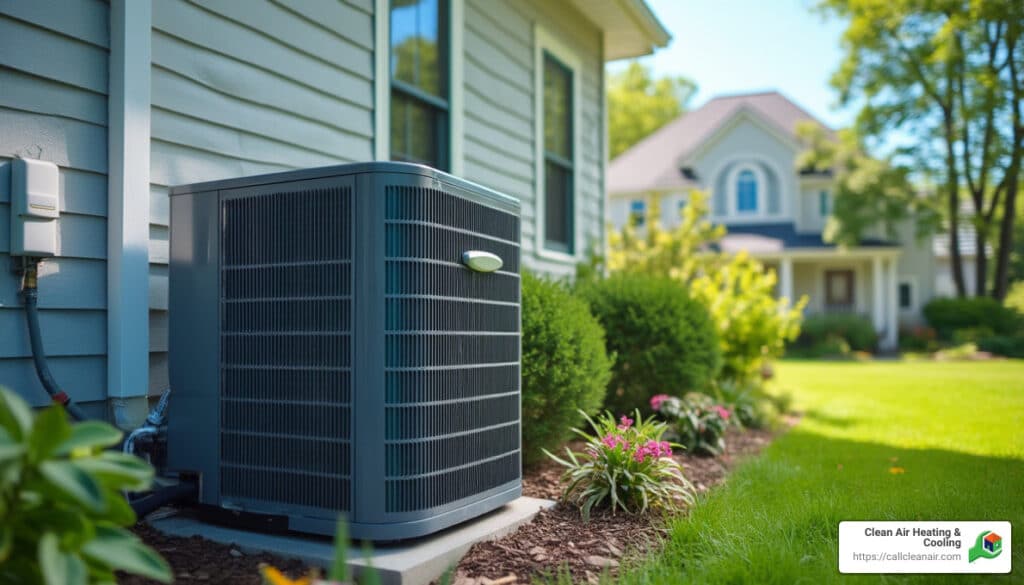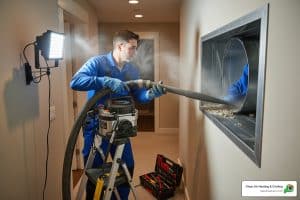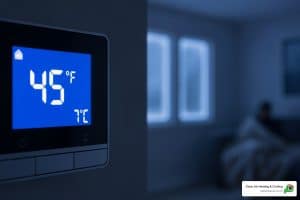Everett heat pump installation provides an efficient and cost-effective solution to keep your home comfortable throughout the year. If you’re considering this upgrade, here’s a quick takeaway:
- Energy Efficiency: Heat pumps are more efficient than traditional HVAC systems, offering both heating and cooling functions with less energy usage.
- Environmental Impact: By using electricity instead of fossil fuels, heat pumps help reduce carbon emissions.
- Cost Savings: With their high efficiency, heat pumps can significantly lower your energy bills over time.
Installing a heat pump in Everett means investing in sustainable and reliable heating and cooling technology. Heat pumps are not only eco-friendly but also provide energy savings by transferring heat rather than generating it, making them a smart choice for energy-conscious homeowners.
I’m Colin Matei, owner of Clean Air Heating & Cooling, proudly serving the Everett community. With years of expertise in Everett heat pump installation, my team and I are dedicated to providing homeowners like you with solutions that improve comfort and reduce energy costs.

Everett heat pump installation vocab explained:
– Everett furnace installation
– Everett air conditioning repair
– Heating and cooling Everett
Understanding Heat Pumps
Heat pumps are a versatile and efficient option for both heating and cooling your home. Unlike traditional systems that generate heat, heat pumps move heat from one place to another, making them a smart choice for Everett heat pump installation.
Types of Heat Pumps
There are several types of heat pumps to consider, each with its unique features and benefits:
- Air Source Heat Pumps (ASHPs): These are the most common type and are ideal for moderate climates. They extract heat from the air and can be used for heating and cooling. ASHPs are known for their ease of installation and affordability.
- Ground Source Heat Pumps (GSHPs): Also known as geothermal heat pumps, these systems use the stable underground temperatures to provide heating and cooling. They are more expensive to install but offer significant energy savings over time.
- Mini-Split Systems: Perfect for homes without existing ductwork, mini-splits offer flexibility in zoning and are highly efficient. They are a great option for room-specific temperature control.

Benefits of Heat Pumps
Heat pumps offer several advantages that make them an attractive option for homeowners:
- Energy Efficiency: Heat pumps are designed to use less energy by transferring heat rather than generating it. This can lead to significant energy savings compared to traditional HVAC systems.
- Cost Savings: Over time, the efficiency of heat pumps can result in lower utility bills. While the initial investment might be higher, the long-term savings make them a cost-effective choice.
- Environmental Impact: By relying on electricity rather than fossil fuels, heat pumps reduce carbon emissions and contribute to a cleaner environment. This makes them an eco-friendly option for those looking to reduce their carbon footprint.

Overall, heat pumps are a smart investment for homeowners in Everett looking to improve their comfort while saving on energy costs. With various types available, you can choose the best fit for your home and enjoy the many benefits they offer.
Preparing for Heat Pump Installation
Site Assessment
Before diving into Everett heat pump installation, a thorough site assessment is crucial. This step ensures that the heat pump will operate efficiently and effectively in your home.
Location: The placement of your heat pump matters. It should be installed in an area with good airflow and away from obstructions like shrubs or fences. This ensures optimal performance and longevity.
Space Requirements: Heat pumps need adequate space for installation and maintenance. Ensure there’s enough room around the unit for air to circulate freely. This helps prevent overheating and improves efficiency.
Noise Considerations: While modern heat pumps are relatively quiet, it’s wise to consider noise levels. Place the unit away from bedroom windows or living areas to minimize any potential disturbance.
Choosing the Right Size
Selecting the right size heat pump is vital for efficiency and comfort. An undersized unit may struggle to heat or cool your home, while an oversized one can lead to higher energy bills and wear out faster.
BTU Calculation: BTU (British Thermal Unit) is a measure of heat output. Calculate the BTU needed for your home based on its size and insulation. This ensures the heat pump can maintain a consistent temperature.
Home Size: Larger homes require more powerful heat pumps. Consider both the square footage and the layout of your home when choosing a unit. A professional can help you determine the best size for your needs.
Efficiency Ratings: Look for high-efficiency ratings like SEER (Seasonal Energy Efficiency Ratio) and HSPF (Heating Seasonal Performance Factor). Higher ratings mean better energy efficiency and cost savings over time.
Professional Consultation
Partnering with a licensed HVAC technician is essential for a successful installation. Their expertise ensures the process is smooth and the system performs optimally.
Installation Planning: A professional will assess your home and recommend the best heat pump for your needs. They’ll plan the installation to minimize disruptions and ensure everything is up to code.
Cost Estimation: An HVAC technician can provide a detailed cost estimate, including equipment and labor. This helps you budget effectively and avoid unexpected expenses.
Working with a professional not only guarantees a quality installation but also provides peace of mind. With expert guidance, your heat pump will be ready to deliver comfort and efficiency for years to come.
The Installation Process
Installation Steps
Installing a heat pump in your Everett home involves several crucial steps to ensure optimal performance and safety. Here’s a quick rundown of the process:
- Preparation: Before installation begins, the site is prepared, which includes clearing the area and ensuring all necessary permits are in place. This step is crucial to avoid any legal or logistical hiccups.
- Mounting: The heat pump unit is carefully mounted in its designated location. Proper mounting is essential for stable operation and longevity. The unit must be level and secure to prevent vibrations and noise.
- Electrical Connections: Next, the heat pump is connected to the home’s electrical system. This requires precise work to ensure safety and efficiency. Proper grounding and circuit protection are vital to prevent electrical issues.
- Testing: Once installed, the system undergoes a series of tests to ensure everything is working correctly. This includes checking the refrigerant levels, inspecting the airflow, and verifying the system’s overall performance.
Professional Installation
Having a licensed HVAC technician handle your Everett heat pump installation is not just recommended—it’s essential. Professionals bring a wealth of experience and adhere to strict safety standards.
- Quality Assurance: A professional installation ensures that every component is correctly fitted and functioning. This reduces the risk of future issues and extends the lifespan of your heat pump.
- Safety Standards: HVAC technicians follow industry safety standards, ensuring that the installation meets all local codes and regulations. This protects your home and family from potential hazards.
- Expertise: Licensed technicians have the expertise to handle any challenges that arise during installation. Their knowledge ensures a smooth process and optimal system performance.
Common Challenges
While installing a heat pump can significantly improve your home’s comfort and efficiency, it comes with its own set of challenges:
- Space Constraints: Limited space can make installation tricky, especially in older homes. Technicians need to be creative in finding suitable locations that allow for proper airflow and maintenance access.
- Electrical Upgrades: Some homes may require electrical upgrades to support the new system. This can include adding new circuits or upgrading the main electrical panel to handle the increased load.
- Weather Considerations: In Everett, weather can impact the installation process. Rain or extreme cold can delay work, so it’s important to plan installations during favorable conditions.
By understanding the installation process and potential challenges, homeowners can better prepare for a smooth and successful heat pump installation. This ensures that your new system will provide comfort and efficiency for years to come.
Maintenance and Repair
Proper maintenance and timely repairs are key to keeping your heat pump running smoothly and efficiently. Let’s explore the essentials of routine maintenance, common repairs, and the importance of professional services.
Routine Maintenance
Routine maintenance is crucial to extend the life of your heat pump and maintain its efficiency. Here are some essential maintenance tasks:
- Filter Cleaning: Regularly clean or replace the filters to ensure optimal airflow and indoor air quality. Dirty filters can decrease efficiency and increase energy costs.
- System Checks: Conduct regular system checks to identify potential issues before they become serious problems. This includes inspecting electrical components, checking refrigerant levels, and ensuring proper airflow.
- Seasonal Maintenance: Schedule maintenance at the start of each heating and cooling season. This helps prepare your system for the demands of changing weather conditions and ensures consistent performance.
Common Repairs
Even with regular maintenance, heat pumps can experience issues that require repairs. Here are some common problems:
- Refrigerant Leaks: Low refrigerant levels can lead to reduced heating or cooling efficiency. Detecting and fixing leaks promptly is critical to prevent further damage.
- Electrical Issues: Faulty wiring or electrical components can cause your system to malfunction. Regular inspections can help prevent these issues and ensure your system operates safely.
- Component Replacements: Over time, parts like fans, motors, and coils may wear out and need replacement. Addressing these promptly can prevent more severe system failures.
Professional Services
Engaging a licensed HVAC technician for maintenance and repair services ensures your heat pump receives expert care:
- Licensed HVAC Technician: Professionals have the training and experience to perform thorough inspections, accurate diagnostics, and effective repairs.
- Emergency Repairs: In case of sudden breakdowns, having access to emergency repair services can restore your system quickly, minimizing discomfort and inconvenience.
- Maintenance Contracts: Consider signing a maintenance contract with a reputable service provider. This offers regular check-ups, priority service, and can often save money in the long run.
Regular maintenance and professional repairs not only improve the longevity of your heat pump but also ensure it operates efficiently, keeping your home comfortable year-round.
Frequently Asked Questions about Everett Heat Pump Installation
What is the price of heat pump installation?
The cost of Everett heat pump installation can vary widely. Most installations range from $7,000 to $85,000. This broad range depends on several factors, including the type of heat pump, your home’s size, and any additional features or accessories you choose.
Factors affecting cost include:
- Type of Heat Pump: Air source, ground source, and mini-split systems each have different price points.
- Installation Complexity: Homes needing extensive ductwork or electrical upgrades will see higher costs.
- Efficiency Ratings: More efficient models tend to cost more upfront but save money on energy bills over time.
Average prices for a standard installation in Everett are typically around $10,000 to $20,000, but it’s best to get a personalized quote from a professional.
How much does it cost to install a 12,000 BTU heat pump?
Installing a 12,000 BTU heat pump in Everett can cost between $3,000 and $8,000. The price varies based on:
- Home Size Considerations: Larger homes may require multiple units, increasing costs.
- Efficiency Ratings: Higher SEER and HSPF ratings can mean a higher initial cost but more savings over time.
For precise cost estimation, it’s advisable to consult with an HVAC technician who can assess your specific needs and home layout.
What is the downside to a heat pump?
While heat pumps offer many benefits, there are some downsides to consider:
- Cold Weather Performance: In extremely cold climates, heat pumps can become less efficient, potentially requiring a backup heating system.
- Electricity Reliance: Heat pumps depend on electricity, which can be costly if local rates are high.
- Initial Cost: The upfront cost of purchasing and installing a heat pump can be significant. However, this is often offset by long-term energy savings.
Understanding these factors can help you make an informed decision about whether a heat pump is the right choice for your home.
Conclusion
Choosing the right company for your Everett heat pump installation is crucial, and Clean Air Heating & Cooling is here to make that choice easy. We pride ourselves on delivering exceptional service, ensuring that your experience with us is smooth and satisfying from start to finish.
Our commitment to customer satisfaction is evident in our 25% utility savings guarantee. This promise means that when you choose us, you’re not just getting a heat pump installation; you’re investing in long-term savings and comfort. Our team of licensed HVAC technicians is dedicated to providing high-quality installations that maximize efficiency and minimize energy costs.
With over 480 5-star Google reviews, it’s clear that our customers appreciate our prompt and professional service. We treat every home as if it were our own, ensuring that your new heat pump is installed to the highest standards of quality and safety.
For more information or to schedule your installation, visit our Heating and Cooling Services in Everett. Let us help you create a comfortable and energy-efficient home environment today.
By trusting Clean Air Heating & Cooling with your heat pump installation, you’re choosing a company that values your comfort and satisfaction above all else. We look forward to making your home a cozy haven, all while saving energy and reducing costs.





